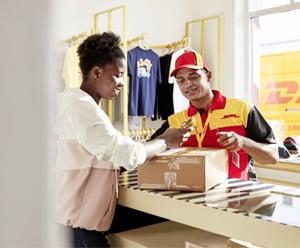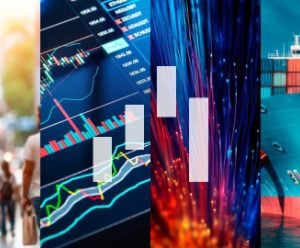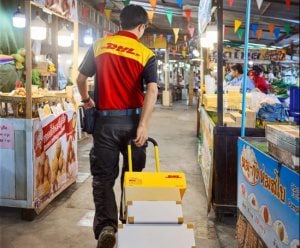
Charting a bold path for MSMEs in a shifting trade landscape

Optimistic. Opportunities. Uncertainty. Recalibrating. These were some of the sentiments about global trade during DHL’s recently concluded GoTrade Summit.
Micro, Small, and Medium Enterprises (MSMEs) invited to the annual conference form the backbone of ASEAN and global economies, representing over 50 percent of global GDP and global employment. However, MSMEs face persistent challenges in accessing finance, navigating digital trade frameworks, and adapting to geopolitical and economic shifts.
The panel discussions and strategic addresses at the DHL GoTrade Summit, which covered financing, digital trade strategies, entrepreneurial journeys, and ASEAN’s economic vision, offered a comprehensive view of the barriers MSMEs face and the collaborative solutions needed to unlock their potential.
Bridging the financing gaps
Access to finance remains one of the most pressing issues for MSMEs, which often struggle with fragmented information, limited financial literacy, and rigid banking requirements.
At the DHL GoTrade Summit, speakers from the Asian Development Bank (ADB), the International Trade Centre (ITC), and the Malaysia External Trade Development Corporation (MATRADE) noted that MSMEs often lack the documentation and credit history required by traditional financial institutions. This results in high rejection rates, forcing many to rely on personal loans or informal funding sources.
Initiatives such as MATRADE’s Best Exporter Program and partnerships with development banks have helped bridge this gap. These programs offer training, market access, and financing support, particularly for MSMEs venturing into non-traditional markets like Africa and the Middle East. The ASEAN MSME Center of Excellence, launched under Malaysia’s 2025 ASEAN chairmanship, aims to support green transition and climate financing for MSMEs, further strengthening their resilience.
Alternative financing platforms such as Kickstarter, equity crowdfunding, and peer-to-peer lending have also enabled founders to launch and scale businesses without relying solely on traditional financing methods.
Accessing trade finance, as highlighted by ITC, requires MSMEs to be investment-ready by improving financial documentation, understanding financing instruments, and building relationships with capital providers. Inclusive, multi-pillar strategies—combining financial education, regulatory reform, and targeted support—are essential to close the global SME finance gap and unlock their full potential.
Unlocking global markets through digital trade
Having the financial foundation to expand the business is just a first step. For MSMEs that need to scale beyond local markets, digital trade is the crucial pathway to global expansion.
However, regulatory fragmentation, lack of standardization, and technological barriers have at times created roadblocks to the smooth transition to digital trade for MSMEs. MSMEs often do not control the digital standards they must comply with; instead, they are subject to the requirements of their customers, customs authorities, and off-the-shelf ERP systems.
One major hurdle is the absence of harmonized digital trade laws. The Model Law on Electronic Transferable Records (MLETR), part of the ASEAN Digital Economy Framework Agreement, aims to address this by ensuring electronic records are legally recognized. Malaysia is leading legislative reform in this area, with support from agencies like MDEC.
Standardization is the key to reducing the burden on MSMEs. Common data formats and interoperable systems are essential for MSMEs to simplify the onboarding process for new customers or markets. Efforts are underway to promote interoperability through AI-driven data translation and mutual recognition of trust frameworks, including blockchain and PKI-based systems.
From the front-end perspective, digital platforms such as eBay, Alibaba, and Kickstarter have helped MSMEs reach international markets. Social media tools such as Facebook, TikTok, and YouTube were instrumental in building brand awareness and driving sales. For many, joining high-traffic marketplaces reduced the need to build their own infrastructure and accelerated their entry into global markets.
Digital transformation and AI are redefining what it means to be a small business in the global economy. SMEs, with their agility and adaptability, are uniquely positioned to benefit from emerging technologies. Open-source AI models and lightweight tools are enabling micro-enterprises to operate with multinational sophistication.
However, access alone is not enough. Building capacity through digital literacy, technical training, and policy support is essential to ensure SMEs can innovate locally and compete globally.
Navigating uncertainty and building resilience in global trade
One common sentiment keeping MSMEs up at night is the growing uncertainty in the trade landscape. The global trade environment is increasingly volatile, shaped by geopolitical tensions, climate risks, and technological disruption. Policymakers and business leaders agree that resilience—not just efficiency—must be the new paradigm. The shift from “just-in-time” to “just-in-case” supply chains reflects this reality.
“The global trade landscape has changed but not for the worse – it is simply evolving as it has done since the "age of discovery" in the late 15th century, and it will continue to take its natural shape over time,” said John Pearson, CEO, DHL Express. “Trade is like water—it will continue to flow and will continue to find a way.”
To that end, DHL’s GoTrade initiative is key in finding new pathways for trade to continue flowing across different points. Launched in 2021, GoTrade aims to increase the number and volume of SMEs trading across borders by removing red tape, simplifying customs procedures, and providing targeted training.
“The idea was simple: we want to help reduce the barriers to global trade, and make it easier for more businesses—especially MSMEs—to access international markets,” said Ken Lee, CEO, DHL Express Asia Pacific.
Since its inception, GoTrade has launched projects in over 60 countries, reaching more than 14,000 small businesses and 5,000 women-owned enterprises. In Malaysia alone, DHL has supported over 2,000 participants across 20 workshops in collaboration with MATRADE. Through its partnership with The Asia Foundation, GoTrade has reached 1,200 women-led SMEs, and in Sarawak, it has supplemented the Artisans Empowerment and Entrepreneurship Programme with logistics training.
The growth potential extends beyond Malaysia, with the Asia Pacific playing an increasingly central role in driving global trade resilience. According to the DHL Global Connectedness Tracker, six of the ten fastest-growing trade lanes in the first half of 2025 originated from Asian economies. Among the top 50 trading nations, Hong Kong SAR, Thailand, Malaysia, and Vietnam ranked in the top 10 for fastest trade value growth. Intra-Asia trade also expanded, with East Asia & Pacific’s intra-regional trade share rising from 55 percent to 56 percent, signaling deeper regional integration.
“With our global network, local expertise, and deep understanding of trade dynamics, we’re here to help businesses—large and small—stay agile, resilient, and competitive,” added Lee.
Unlocking trade potential through collaboration and ecosystem building
MSMEs cannot thrive in isolation. That was the recurring message echoed during the DHL GoTrade Summit, highlighting the importance of ecosystem collaboration. The crucial ask from MSMEs is further support from governments, financial institutions, logistics providers, and international organizations.
Malaysia’s Madani Economy Framework and New Industrial Master Plan emphasize a whole-of-nation approach to MSME development. The goal is to transform MSMEs into “hidden champions”—globally competitive firms with niche expertise and homegrown technologies. This requires coordinated efforts across financing, automation, green transition, and export readiness.
MATRADE’s persistent efforts to connect MSMEs with banks, trade platforms, and export opportunities exemplify this approach. The ASEAN Coordinating Committee on MSMEs is also working to harmonize regulations and build capacity across member states. Programs like the ASEAN-EU Sustainable Connectivity Package aim to streamline digital and sustainability-related regulations, making cross-border trade more accessible.
The GoTrade GBSN Fellowship Program further extends this assistance by pairing graduate business students with SMEs in developing countries. Fellows provide consulting support to help MSMEs access global markets, while gaining hands-on experience in international trade environments.
On the operational front, MSMEs who partner with DHL Express can utilize its MyGTS platform to help them estimate duties, identify HS codes, and streamline documentation—critical for building trust with international buyers.
The future of global trade
The evolving global trade landscape presents both challenges and opportunities for
MSMEs. Through collaborative efforts, innovative programs like GoTrade, and strategic regional integration, MSMEs are increasingly empowered to participate in international markets. Asia Pacific, particularly ASEAN, is emerging as a central force in driving trade resilience and inclusive growth.
Today, it is essential to maintain momentum, foster public-private partnerships, and ensure that MSMEs have the tools, knowledge, and support to thrive in a dynamic global economy.
“Global trade, and the macroeconomic situation, have thrown up more obstacles, but our reaction must not be to batten down the hatches and look inwardly, but rather to take action, be creative, and look for new markets, new partners, and new beginnings,” noted Pearson. “We must work even harder to ensure the inclusivity and the accessibility of MSMEs, paving the way toward shared prosperity.”
ALSO WORTH READING
















 English
English